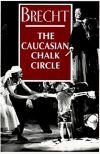
Life of Galileo, also known as Galileo, is a play by the twentieth-century German dramatist Bertolt Brecht with incidental music by Hanns Eisler. The second version was written between 1945–1947, in collaboration with Charles Laughton. The play received its first theatrical production at the Zurich Schauspielhaus, …

الأم شَجاعة وأبناؤها هي مسرحية ألفها الشاعر والمسرحي الألماني برتولت بريشت في عام ١٩٣٩ بمساهمة معتبرة من الكاتبة والممثلة الألمانية مارغريت ستيفن. وينظر لها من قبل الكثيرين على أنها أعظم مسرحية في القرن العشرين. وقد تكون أعظم مسرحية مناهضة للحرب على …

The Good Person of Szechwan is a play written by the German theatre practitioner Bertolt Brecht, in collaboration with Margarete Steffin and Ruth Berlau. The play was begun in 1938 but not completed until 1943, while the author was in exile in the United States. It was first performed in 1943 at the Zürich …

The Threepenny Opera is a "play with music", translated by German dramatist Elisabeth Hauptmann from John Gay's 18th-century English ballad opera, The Beggar's Opera, and insertion ballads by François Villon and Rudyard Kipling, adapted by Bertolt Brecht to music by Kurt Weill. The work offers a Socialist critique of …

تعتبر دائرة الطباشير القوقازية ثاني أهم مسرحيات برتولت بريشت بعد الأم شجاعة وهي من نمط المسرح الملحمي الذي اعتمده بريخت. تقوم هذه المسرحية على عدد هائل من الشخصيات ليس لديها أبعاد نفسية إنما تشكل أفعالها غستوس يؤدي إلى معرفة مفولة المسرحية التي يطرحها بريخت علنا على لسان المغني في النهاية. أما من حيث الحبكة فالمسرحية …

Translated by Desmond I Vesey. Verses Translated by Christopher Isherwood. Ex-library Sticker on the Front..Softback,Ex-Library,with usual stamps markings, ,in fair to good all-round condition, ,365pages.

Bertolt Brecht Translated by George Tabori Drama Characters: 30 male, 5 female Brecht's shudderingly accurate parallel between Hitler and his henchmen on the one hand and the old crime lords of Chicago on the other is a vigorous eye opener that was produced on Broadway with Christopher Plummer. The Cauliflower …

Bertolt Brecht's Stories of Mr. Keuner is a collection of fables, aphorisms, and comments on politics, everyday life, and exile. From 1930 til his death in 1956, Brecht penned these ironic portraits of his times as he was "changing countries more often than shoes." An ardent antifascist, Brecht roamed across Europe …

 English
English Español
Español Deutsch
Deutsch

